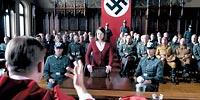"Sophie Scholl": The brief, brave life of a thorn in Nazis' side

Marc Rothemund's wrenching World War II drama "Sophie Scholl: The Final Days" doesn't use any cinematic flourishes and embellishments; it doesn't need to. Its fact-based story, of a clear-eyed young woman who marched bravely to her death rather than betray her beliefs, speaks for itself, in a voice loud and soaring.
Scholl (played unblinkingly by Julia Jentsch) is a member of the White Rose, an underground student movement in Munich dedicated to toppling the Third Reich war machine. In 1943, after furtively distributing leaflets at a university building, she and her brother Hans (Fabian Hinrichs) are arrested by the Gestapo. After lengthy cross-examination by interrogator Robert Mohr (Alexander Held), she is accused of treason, tried, convicted and executed within a matter of a few days, in a mockery of justice. The manner of her death is so shocking, you may need to look away.
"Sophie Scholl: The Final Days," with Julia Jentsch, Alexander Held, Fabian Hinrichs, André Hennicke, Johanna Gastdorf. Directed by Marc Rothemund, from a screenplay by Fred Breinersdorfer. 117 minutes. Not rated; for mature audiences. In German with English subtitles. Varsity, through Thursday.
In Rothemund's film, we see this young woman, guilty of nothing more than expressing opposition to her country's government, treated as if she were no longer human. Guards haul her about by the arms, dragging her as if they might a recalcitrant dog, even though she is not resisting. Through it all, Sophie is calm, finding strength in prayer (she was a devout Protestant) and in her own sureness. In one scene, in the middle of an interrogation, she asks for a break and is escorted to a bathroom. She looks in a mirror, weeps briefly, and then stops and takes a breath, willing herself to go on.
For the screenplay, writer Fred Breinersdorfer consulted many previously unpublished documents recently made available, including the original minutes of the interrogations. It's impossible to know exactly which words in the film are taken from them, but there's a realism in these scenes — filmed very simply, with little light — that's startling. Sophie, who often has just the tiniest hint of a smile on her face, answers every question, sometimes with words that illuminate her soul. When the topic of the Nazi extermination of mentally ill children is raised, she says quietly, "You think I wasn't raised right because I feel pity for them?"
The courtroom scenes, featuring a howling, over-the-top judge (André Hennicke), seem to be taking place in some insane parallel universe — and yet these, too, are based on fact. (Authors Annette Dumbach and Jud Newborn, in the book "Sophie Scholl and the White Rose," note that judge Roland Freisler "seemed to revel in a kind of dementia that was turned off and on again without warning.") The blood-red Third Reich flag hangs in the courtroom, seeming to suck all the color out of the room. Justice, it appears, was removed long ago.
As the final credits roll, complete with fading photos of a laughing and vibrant Sophie, "Sophie Scholl: The Final Days" has become a horrifying reminder of a time that must not be forgotten.
Moira Macdonald: 206-464-2725 or mmacdonald@seattletimes.com